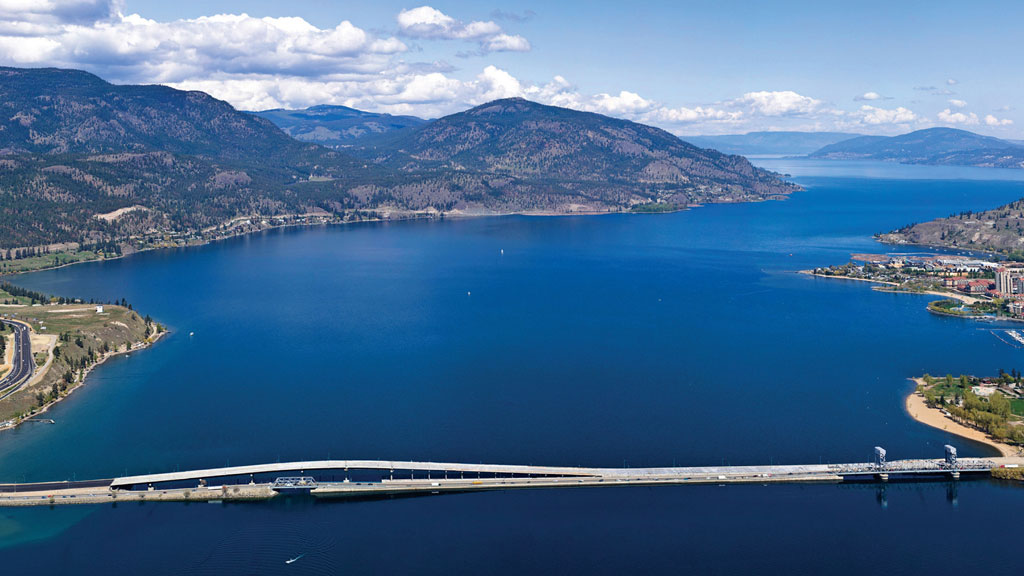The Kelowna Chamber of Commerce is urging B.C. Transportation and Infrastructure Minister Rob Fleming to consider building a second bridge over Okanagan Lake because of anticipated population growth in the region.
The organization states in a public letter sent to the minister that Kelowna is one of the fastest-growing census metropolitan areas in the country, but aside from highway maintenance, it appears the region is all but being ignored when it comes to major provincial investment in transportation infrastructure.
ÔÇťOur region is expected to add a combined 60,000 people by 2040 yet no major infrastructure projects are on the books,ÔÇŁ writes Dan Price, chair of the chamber. ÔÇťPlease let us know if this is incorrect and a second crossing, reducing the number of controlled intersections, plus the consideration of bypass routes are still to be considered prior to 2040.ÔÇŁ
The organization is advocating for a new bridge to connect Kelowna with West Kelowna. Presently there is only one crossing ÔÇô the W. R. Bennett Bridge, which opened in 2008.
The call for a second bridge was first proposed by former B.C. Premier Christy Clark who indicated during her campaign for re-election in 2014 that she would commit $2 million for planning of the project. However, it now appears the idea has been shelved by the province in favour of plans to tweak intersections.
Kelowna council had also ruled out the option of a second cross-lake structure in 2019, citing concerns construction costs, which could exceed $1 billion, were too high for the city even with funding from the province.
According to the chamber though, the crossing is needed as the regionÔÇÖs population is exploding and studies show the Bennett Bridge, a 1,060-metre-long, five-lane pontoon crossing that was designed to handle up to 80,000 vehicles a day, will reach capacity in 2040 and not be able to accommodate more users.
Chamber CEO Dan Rogers says the latest study indicates the pace of population growth in the region has increased significantly and the business community is worried the province isnÔÇÖt doing enough to offset a pending crisis.
ÔÇťIt became pretty apparent to us over the last year, when we were hearing from local government, that in fact there was very little capital planning going on in the central Okanagan.ÔÇŁ
In 2022, the chamber adopted a policy that aimed to draw attention to the lack of investment in planning and transportation infrastructure to serve the region. It suggested the government re-engage the business community and industry leaders in the Okanagan to identify and implement strategic regional investments in the transportation network, which included accelerating planning for a second bridge.
The policy also highlighted key safety issues and proposed a vision for a bypass route that would allow heavy industrial traffic to move more efficiently through the region by reducing the number of stoplights.
According to Rogers, the chamber is now waiting for results of a commercial goods study and will work with logistics operators to ensure MLAs are up to speed on the issue and that the Okanagan gets its share of transportation funds.
The chamber is also trying to encourage mayors and councils in the central Okanagan that they need to speak up for the citizens that are being impacted, particularly from a safety perspective because, along the Hwy. 97 thoroughfare and particularly in Kelowna area, there has been a significant rise in traffic fatalities.
Kelowna is home to eight of the top-10 crash intersections in the Southern Interior. Seven of those intersections are on the provincially controlled Hwy. 97/Harvey Avenue within city limits.
ÔÇťPeople are dying because of the congestion and the design, quite frankly, of the highway that is putting people at risk.ÔÇŁ
If a second crossing is not on the immediate wish list, the chamber wants to know specifically how the provincial government plans to address the future population growth.
So far, business leaders have not received a response from the transportation and infrastructure minister.
ÔÇťThereÔÇÖs been a lot of silence since we sent that communication off,ÔÇŁ says Rogers.
The chamber is trying to convey the message that the province is setting the stage for major costs down the road by failing to address issues now.
ÔÇťInvesting in highways takes time and construction takes time,ÔÇŁ notes Rogers. ÔÇťBut if youÔÇÖre not planning, itÔÇÖs a remedy for higher costs down the road when you have a crisis.ÔÇŁ
To put more pressure on the province, the chamber is also working to bring local government leaders together in the Okanagan area to show a united front.
ÔÇťWe certainly arenÔÇÖt going away on this issue,ÔÇŁ notes Rogers. ÔÇťWeÔÇÖre working and reaching out to all the logistics operators. There has been such a focus in a positive way on moving people out of vehicles to transit but as we said to the local government leaders here, we havenÔÇÖt seen a way to get a log onto a bus.ÔÇŁ







Recent Comments
comments for this post are closed